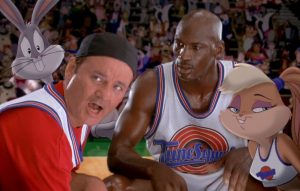Michael Jordan will be introducing Kobe Bryant into the Basketball Hall of Fame this afternoon. Fitting, right? The man who has been tragically immortalized too young receiving a few words from the closest thing we have to a god walking the earth. Today, Jordan will almost certainly be nostalgic, introspective, and full of praise for Bryant. Jordan will strike the right tone and Kobe deserves as much. Today is his day. But it’s also Jordan’s mulligan at the event meant to confirm eternal basketball royal status.
Michael Jordan’s own Hall of Fame speech took place on September 11, 2009, and can be found here. It’s been viewed 20 million times on YouTube since 2012 and has 27 times more likes than dislikes. The top comments on the post are filled with praise as far as the eye can scroll. The first search result for an opinion angle on the event, a fairly balanced piece from Jon Greenberg, introduces the speech as “oddly compelling,” “sometimes funny,” and “littered with (Jordan’s) own tears and his own jokes, and most were good-natured.” The editor even begins the video in the middle of someone’s sentence during the long-winded introduction for Jordan so the total clip comes out to 23 minutes, 23 seconds long.
Jordan finishes his speech: “Limits, like fears, are often just an illusion.” And I agree. We have no limits in our quest to deify Michael Jordan.
It’s just about impossible for me to finish this piece unless you watch the speech. But after you’re done, read this article from Adrian Wojnarowski on the occasion. Turns out before Woj was cleverly tipping draft picks on social media and sending blunt emails to Senator Josh Hawley, the man could write a heck of an op-ed without tending to the obsequious praise for #23 that everyone else seemed so preoccupied with. I don’t really have much to add in the way of responding to the content of the speech because Woj nails it.
Actually, maybe he even goes a bridge too far. Jordan didn’t have a responsibility to strike a certain chord with any past or present players or be an ambassador for the game. He’s always done things his own way. And maybe the shot about Jordan’s tone being the reason he’s been a largely awful executive with Charlotte Hornets was unfair. But how to summarize the speech? I agree. It was adolescent, it was unfocused, it was a complete joke.
It’s hilarious and sad that, on that day in Springfield, Mass., Jordan had to follow David Robinson and John Stockton, men amongst men with eons more humility than anyone could reasonably expect of a Basketball Hall of Famer. It’s telling that, with sources only Woj has, he was able to anonymously quote another Hall of Famer and a basketball executive who just seemed downright depressed afterward. And it is incomprehensibly gross that Jordan flew Leroy Smith, the man who made the varsity basketball team over him in Jordan’s sophomore year of high school, to the ceremony so all cameras could be trained on Smith while Jordan took one last lash at him and their coach.
Above all, the speech is incredible because it is perhaps the clearest evidence that the man who we revere unanimously, who is automatically discussed as at least the joint-best player of all time, was still so ridiculously insecure.
In the end, is that why Jordan seems like a mirage of pixels on Charlotte Hornets broadcasts? We don’t know him, not like we knew Ali as he traveled the world as a humanitarian after retirement, not like we knew Willie Mays as he tried to impart wisdom on New York Mets hitters before (very humanly) taking a better gig at an Atlantic City casino. This isn’t a function of “Republicans buy sneakers, too.” We don’t have so many memories associated with Jordan the player and so few associated with Jordan the homo sapien because he was agnostic toward real-world issues. We might just feel that way because he was a d-bag in the real world.
I think of Novak Djokovic, the men’s tennis superstar who is already probably the joint-best player of all time with Roger Federer and Rafael Nadal and could claim that throne alone in the coming years. The most obvious similarity between Djokovic and Jordan is quite clearly their legendary mental fortitude. Djokovic is not quite blessed with Federer’s prodigious serve or Nadal’s mesmerizing forehand, but he is perhaps the best survivor sports have ever seen – Federer and Djokovic have faced off in 17 Grand Slam matches, and in three of them, Djokovic won despite facing multiple match points. But Djokovic is also exceedingly human, like Jordan – he’ll sometimes smugly point out the crowd’s opposition to him in a victorious postgame interview, he walked to the net with a smirk before doing his tedious grass-eating bit after winning the legendary Wimbledon final in 2019, and so on. He longs for our affection, quite obviously. But when the dust has settled, Djokovic can show immense humility. After that four-hour, 57-minute Wimbledon ‘19 final (one of the matches that Federer had multiple match points to seal the deal much earlier), he downplayed the ridiculous praise he had earned to commend the Swiss for inspiring him at 37 years old. Yet almost all of us Westerners (seriously, listen to the crowds in any of the Big Three’s Grand Slam matches) look past this graciousness and continue to latch onto Djokovic’s moments of petulance and insecurity as justification to ferociously root on his opponents. And for Jordan, of course, we do the opposite. He is just as dominant as Djokovic and has all of his ego, yet never extends his own olive branch. And we continue to nitpick Djokovic and bend over backwards to build up MJ.
Jordan’s diatribe probably deserved new analysis in light of “The Last Dance” docuseries, but it didn’t get any. There’s no mention of the induction on Jordan’s Wikipedia, which is fine. But “The Last Dance” is being regarded as the final say on Jordan’s unparalleled career, which is quite disappointing given that Jordan’s production company, Jump 23, was listed as a partner. His Airness probably had to approve every second of footage that made it to the big screen. The series makes halfhearted attempts at objectivity – hey Michael, remember when you played the grizzled vet demeaning the rookie Scott Burrell, haha – but that’s all a sham. It was Jordan making one last desperate attempt to remind people that he is the greatest while LeBron James continues to play at an MVP level at 36.
By now, we know enough to separate Jordan the athletic marvel and Jordan the man. When he got around to addressing his kids in the Hall of Fame speech, all he could offer was: “I wouldn’t want to be you guys.” How helpful. I’ll probably never be able to come to my own satisfying conclusion about who is the best of all time – Jordan and LeBron played in different eras, their career arcs look so different, etc. But I have realized that in the debate, I’m rooting for LeBron.






